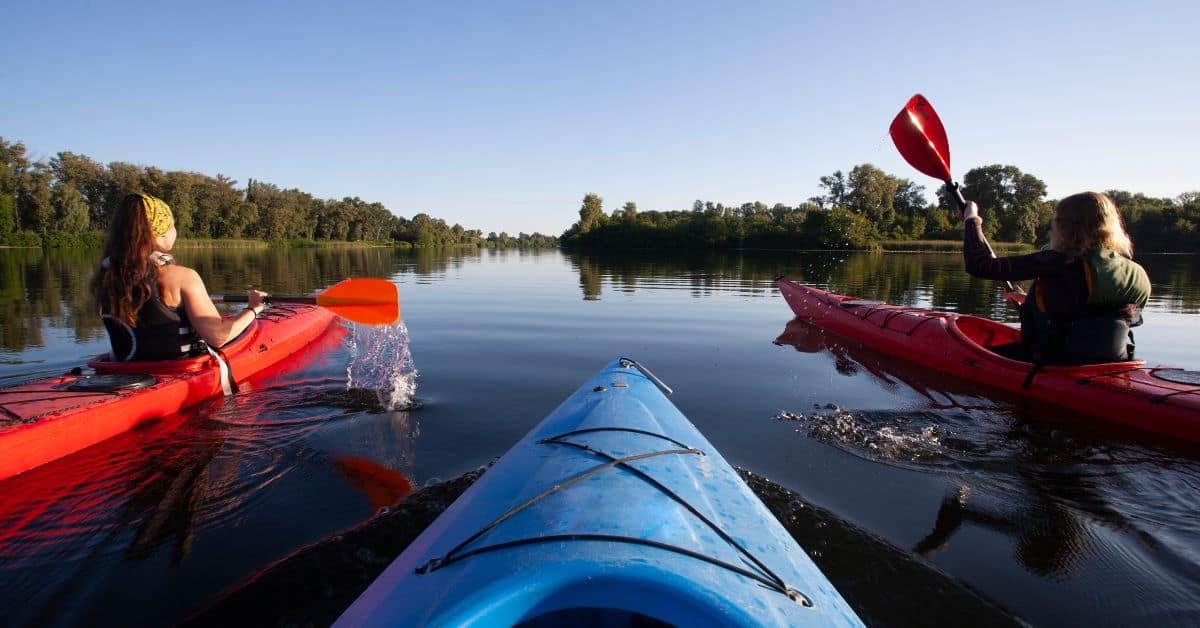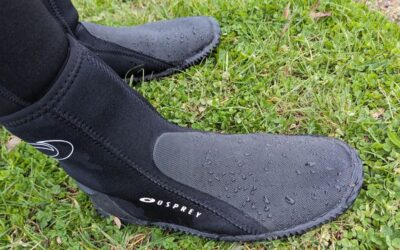In the world of paddle boarding, or any other sport which utilises the British waterways, understanding the licensing rules is critical.
Whether you’re new to these exciting sports or a seasoned professional, it’s crucial to know where and when you need a waterways licence to paddle in the UK.
What is a Waterways Licence?
You might wonder, what is a waterway licence? Unlike a driving licence, there’s no test to acquire a waterway licence. It is a simple permit that anyone can buy, granting you the right to explore the vast and beautiful inland waterways of the UK and Wales. This includes the vast network of rivers and canals that weave their way through the heart of the British countryside. But why do you need one?
Disclaimer: If you make a purchase via the links on our site, I may earn an affiliate commission at no additional cost to you. You can read my affiliate disclosure in the privacy policy. Thanks for your support!
Why Do You Need a Waterways Licence?
Now, you might wonder, why do you need such a licence? The answer lies in the crucial role the licence fee plays. The income generated from the sale of waterway licences directly contributes to the maintenance and protection of these waterways, managed by organizations like the Canal & River Trust, the Environment Agency, the Broads Authority and other private bodies.
The services they provide include the upkeep of water banks, managing water quality and levels, flood prevention, and dealing with invasive non-native species. So, by acquiring a licence, you’re not only ensuring your legal access to the waterways but also supporting the efforts to keep these environments safe and clean for future generations.
Plus, having a waterways licence means you are at no risk of getting a fine! More on that in a minute.

Where Do You Need A Licence to Paddle In The UK?
The need for a licence primarily applies to the majority of managed rivers and canals in England and Wales. If ever in doubt, it is always best to check the British Canoeing website to confirm which waterways require a licence.
Here are some of the most popular waterways to explore in the UK which require a licence:
Avon Navigation Trust
Basingstoke Canal Authority
New Bedford River
Old Bedford River
Grand Union Canal, including; Brentford to Braunston, Napton to Birmingham
Leeds and Liverpool Canal, although this excludes the Liverpool Link and Docks
River Lea from Limehouse Basin to Hertford
Stourport to Gloucester on the River Severn
Llangollen Canal
Norfolk and Suffolk Broads
River Thames – Cricklade Bridge to Teddington.
Jubilee River and Maidenhead Waterway
Trent & Mersey Canal
Regent’s Canal
River Wey
Sheffield & Yorkshire Canal and including sections of River Don Navigation
Shropshire Union Canal
Wey and Godalming Navigation
Wiltshire and Berkshire Canal
Worcester and Birmingham Canal
Where Can You Paddle Without A Licence
While the importance of having a waterways licence for certain locales can’t be understated, it’s worth noting there are still plenty of places across the UK where you can enjoy this activity without requiring one. Certain unpowered crafts, such as inflatable kayaks or paddle boards, can freely navigate the sea, many lakes, and a selection of rivers that do not fall under managed waterways.
For instance, the expansive British coastline, teeming with accessible beaches, bays, and estuaries, provides excellent opportunities for paddle boarding, canoeing, and kayaking. Furthermore, numerous lakes and reservoirs around the country, including popular destinations like Coniston Water, Ullswater, and Lake Windermere in the Lake District, also allow paddle enthusiasts to take to the water without the need for a licence.
In addition to the coastal waters and lakes, there’s a substantial assortment of rivers and canals scattered throughout the UK that also permit licence-free paddle boarding.
Bristol Avon: Bristol City Council
Royal Military Canal: Folkestone & Hythe District Council
Grand Western Canal: Devon County Council
Chelmer & Blackwater Navigation – Essex Waterways
Chichester Canal
Kennet and Avon Canal
Grand Union Canal
Llangollen Canal
Leeds and Liverpool Canal
River Great Ouse
River Medway
River Severn between Pool Quay near Welshpool and Stourport.
River Wye below Hay-on-Wye.
River Rother in East Sussex
River Lugg from Leominster
In Scotland, the rules differ from those in England and Wales. Thanks to the Scottish Outdoor Access Code, you do not require a waterways licence to paddle on most inland waterways.
This legislation grants everyone rights of access to most land and inland water, whether it’s for recreation, exercise, or educational purposes, provided it’s done responsibly. This access right includes non-motorised activities like canoeing and paddle boarding on rivers, lochs, and canals.
However, you should always be aware of any local access restrictions or bylaws, as there may be some exceptions. Always respect the natural environment and the rights of others, and abide by the leave no trace principles to ensure these waterways remain available and enjoyable for all.

How Do You Get A Waterways Licence?
Acquiring a waterways licence is quite simple. If you reside in England or Wales, you can secure a waterway licence through membership with British Canoeing or Canoe Wales. This is one of the most comprehensive waterways licences available, covering a multitude of waterways, over 4500km in total, making it a cost-effective option for paddleboarders, canoeists, and kayakers.
The annual membership fee for British Canoeing or Canoe Wales, which includes the waterway licence, is approximately £47. There is also an option to purchase a licence directly from the Canal & River Trust would where yearly licences cost £64.54, making the British Canoeing or Canoe Wales membership a more attractive option with additional benefits such as public liability insurance and discounted craft insurance.
You can purchase a waterways licence via one of the links below
British Canoeing Membership – £47 a year
Canoe Wales Membership – £47 a year
Canal and River Trust Licence – £64.54 a year

What Is The Penalty For Getting Caught Without A Licence?
If you’re found paddle boarding or engaging in similar activities on managed waterways in the UK without the necessary licence, you could face consequences.
If you’re found without a valid licence, the first step is often a warning or a reminder from the authorities about the need for a licence. They might give you the opportunity to purchase a licence on the spot or within a specific timeframe.
However, if you ignore these warnings or are repeatedly caught without a licence, you could be subject to more serious repercussions. This could include a hefty fine or even legal proceedings, depending on the severity and frequency of the offences.
Therefore, it’s always recommended to check the requirements of the waterway you plan to use, purchase the appropriate licence if needed, and always carry proof of your licence when out on the waterways.
Final Thoughts
In conclusion, having a waterways licence is an integral part of enjoying paddle boarding in the UK. It not only allows legal access to over 4500km of the most beautiful rivers and canals but also contributes to their preservation. Therefore, if paddle boarding is your passion, consider securing a licence and embark on your adventures, responsibly enjoying the scenic waterways of the UK.
What to read next: How To Paddle Board: Complete SUP Guide for Beginners
Waterways Licence FAQ
How much is a UK waterways licence?
As of the last update in 2023, the annual membership fee for British Canoeing or Canoe Wales, which includes the waterways licence, is around £47. If you prefer to buy a licence directly from the Canal & River Trust, it would cost £64.54.
Do I need a licence to kayak on rivers?
Yes, you typically need a licence to kayak on most managed waterways in the UK, which include many rivers. However, there are some waterways, including certain rivers and lakes, where you do not require a licence. Always check the specific regulations for the location you plan to kayak.
Do I need a license to paddleboard?
In the UK, you do need a licence to paddleboard on many inland waterways, including canals and many rivers. However, you do not require a licence for paddleboarding on the sea or specific lakes and rivers. Always check the rules for the location you plan to paddleboard.
Is it legal to paddle board anywhere?
No, it is not legal to paddle board anywhere. While you’re free to paddle board in many places, certain locations, especially managed waterways, require you to have a licence. Furthermore, some waterways may have local bylaws or restrictions that limit paddle boarding. It’s always a good practice to research and respect local rules and regulations before paddle boarding.
Where can I use a paddleboard in the UK?
There are many places you can use a paddleboard in the UK. This includes a vast range of rivers and canals, for which a waterways licence is typically required. There are also many lakes and coastal areas where you can paddleboard without a licence. Popular places include the Grand Union Canal, River Thames, Norfolk Broads, Lake Windermere, and along the British coastline.
Can you paddle board on any lake?
Not all lakes allow paddleboarding. Some lakes have specific restrictions based on factors such as environmental protection or private ownership. Before heading out to paddleboard on a lake, always check whether it’s allowed and if a licence is required. In many cases, information can be obtained from local authorities or through online resources.

About the Author
Steve Cleverdon is an adventure blogger dedicated to helping outdoor enthusiasts make the most of their outdoor experiences. With years of travel and many epic adventures including a 3000-kilometre solo hike across New Zealand, Steve has amassed practical knowledge on outdoor gear. You can learn more about his adventures here. Through expert reviews, recommendations, and guides, he equips his readers with the best gear for their next adventure. If you want to send Steve a quick message, visit his contact page here.




